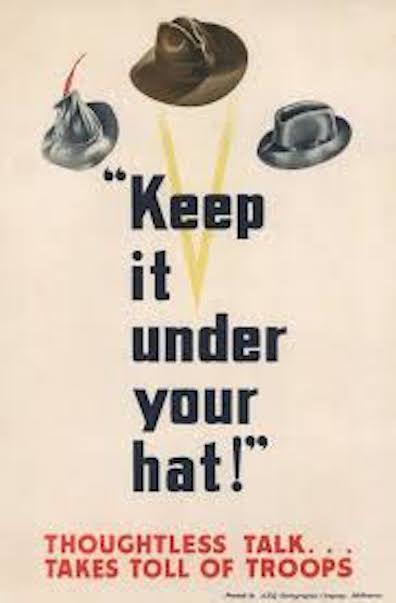Operation Inspiration
As a wordie (is that a thing? I mean, can you be a wordie like you can be a foodie? Like it’s the same idea just with a lot fewer calories and no pictures?) I enjoy words and phrases and their origins and uses. I recently researched the above phrase, mildly appropriate I think, since it’s about a hat and it’s at the top of this column, and found out some interesting things.
You see, this phrase, like many others I’m sure, has gone through a metamorphosis. In its earliest uses, “keep it under your hat,” was an expression advising people to keep certain things under their hats, i.e., “in their heads,” as ideas, rather than bringing them to fruition through words or action. This is definitely an admirable piece of advice. I’m sure many of us at one time or another wish we’d heeded this advice and kept our mouths shut and things locked up in our brains.
As either Abraham Lincoln, Mark Twain, or some other person said, “It’s better to keep your mouth shut and appear stupid than open it and remove all doubt.” Rabban Shimon ben Gamliel phrased it in the Mishna, “I found nothing better for the body than silence.” Or, we can take it back even further to Shlomo HaMelech who said, “Even a fool who makes himself silent is thought to be wise,” in Mishlei 17:28. So, it would appear that the expression in its original form made, and still makes, a lot of sense.
Then, sometime in the late 19th Century, around 1890 perhaps, it came to mean to keep something a secret. This may have to do with Abraham Lincoln’s habit of hiding important documents inside the lining of his famous stovepipe hat, which he often referred to as his office. So, now, if someone tells you to “keep something under you hat,” they’re basically saying to keep it secret (unless of course, you’re trying to carry medicine with a shinui on Shabbos when there’s no Eruv and putting the medicine under your hat is not the normal way of carrying.)
As I thought more about it, I realized that they are still pretty much the same thing. Keep something to yourself and don’t spread it around. It’s pretty solid advice if you ask me. Of course, it’s not something that’s easy or fun to do. When we tell people secrets, they tend to be interested.
I recall a story where someone knew that R’ Chaim Brisker was privy to some information that wasn’t common knowledge. He approached R’ Chaim and asked him to confide in him to disclose the details. R’ Chaim looked both ways, then leaned forward and asked in a conspiratorial whisper, “Can you keep a secret?” The man frantically nodded, whereupon R’ Chaim leaned in a bit more and said, “So can I.”
While I’m sure you’re riveted by my stories and my insights regarding this phrase, you know that I didn’t come upon this by chance. The truth is that what motivated me to write this was something I literally keep under my hat.
You see, I have one of those nifty plastic hat boxes with a handle that makes it so easy to travel with your hat. Do you remember traveling? Like before the days of quarantines, lockdowns and social distancing? Well, in this hatbox I keep something I put in there in March of 2020.
It is the schedule and directions from a Bar Mitzvah I attended the week before Purim. It was a world away, back when you stayed in people’s houses, ate communally in large groups, hugged friends and relatives, and shook hands with strangers.
It seems strange that it wasn’t even a year ago that the whole world experienced this paradigm shift and the change to what became the new normal. And that’s why I keep the schedule there. To be honest, the main reason I did it at first was because for months I had no occasion to wear my Shabbos hat. I didn’t leave home for a long time and then, even when I did, it wasn’t to go to shul indoors so I didn’t need my hat.
After that, when I finally had the opportunity to open my hatbox and saw the paper, it had so much meaning to me. It reminded me of a time when things were “normal,” when we were free to go to simchos and share in other people’s joy. It was when we went to daven without masks and sang out loud from the bottom of our hearts. It’s something that I felt we’d lost.
Now, though, I keep it to remind myself that we never know what tomorrow may bring. We don’t know what Hashem will want from us, but we have to be ready for whatever it is. It’s something I keep under my hat, that is, in my head, and try not to forget. I don’t need to get used to a new normal and forget the past. I need to remember it all, and grow from whatever life (and by life, I mean Hashem) decides to throw at me. In the words of a dear friend, “It’s all good.” And that’s what I want to remember – above all else.
© 2020 – All Rights Reserved
Did you enjoy this column? Feedback is welcome and appreciated. E-mail info@JewishSpeechWriter.com to share your thoughts. You never know when you may be the lamp that enlightens someone else.






